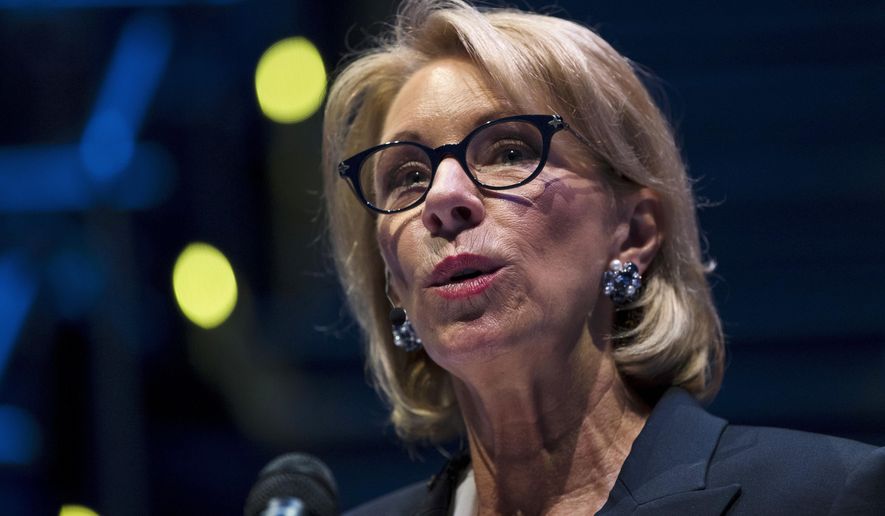Expect plenty of outrage when Education Secretary Betsy DeVos unveils her overhaul of the Obama-era Title IX rule governing college sexual-assault cases — and behind the scenes, an outpouring of relief.
Take Andrew Miltenberg’s clients. The New York City lawyer has represented hundreds of students, as well as several dozen faculty members, who contend they were railroaded by college tribunals that tilt the process in favor of the accuser.
“I think what Betsy DeVos is doing is bringing the process and policy back toward the center, back toward an equitable place,” said Mr. Miltenberg. “The real problem is going to be the boots on the ground are going to push back heavily.”
Indeed, groups such as End Rape on Campus, the National Women’s Law Center and NARAL Pro-Choice America took aim this week at the highly anticipated overhaul after The Washington Post reported it could be released by Thanksgiving.
Mrs. Devos “is determined to make it harder than ever for survivors of sexual assault to seek justice on campus,” tweeted Planned Parenthood Action. “This is horrific.”
None of this is likely to dissuade Mrs. DeVos, a favorite target of the left who last year rescinded the hotly disputed 2011 “Dear Colleague” guidance issued by the Education Department’s Office for Civil Rights.
Her proposed replacement is expected to allow schools to select a standard of proof for sexual-misconduct cases in a break from the Obama-era policy, which directed universities to use the lower “preponderance of the evidence” standard when determining guilt.
Mrs. DeVos also is expected to include provisions limiting university liability, confine responsibility to incidents occurring on campus, and tighten the definition of sexual assault to exclude behavior such as unwanted jokes and flirting, as shown in a draft leaked in September.
The new rule also would guarantee the right of the accused to cross-examine the accuser, although they would be in separate rooms and conducted by a neutral party, according to media reports.
Sen. Ron Wyden, Oregon Democrat, accused her Wednesday of “stifling” survivors, while NARAL Pro-Choice America called the cross-examination provision “absolutely sickening.”
Those girding to fight the DeVos proposal will have an opportunity to do so: Unlike the Obama directive, which was imposed on schools without public input, the DeVos rule will be published in the Federal Register and available for comment.
“That was one of our huge issues with the 2011 Dear Colleague letter: that the public stakeholders didn’t have an opportunity to provide input,” said Samantha Harris, vice president for procedural advocacy for the Foundation for Individual Rights in Education, which opposed the policy.
“Leaving aside the substantive changes, just the fact that there’s going to be greater accountability, that the department is going to be soliciting feedback from stakeholders is really important,” Ms. Harris said. “There’s a lot more transparency here.”
She said more than 350 federal and state lawsuits have been filed by students since 2011 challenging the lack of due process after being suspended, expelled or otherwise punished for sexual misconduct and other transgressions.
“Anecdotally, I can say that not a week goes by that we don’t receive an inquiry from a student or parent concerned about denial of due process in a campus case,” Ms. Harris said.Mr. Miltenberg may be the best-known campus due-process attorney in the country. He represented the Columbia University student who was accused of rape by “mattress girl” Emma Sulkowicz. Last year, the university reached a settlement with the student and issued a statement of regret for his experience.
Since the 2011 Dear Colleague letter, he said, another class of victims has emerged: “Men who are either wrongly accused or found responsible as part of a protocol or mechanism at most universities that is negligent at best, and at worst designed to find men responsible.”
After Mrs. DeVos rescinded the guidance, the University of Kentucky redid its rules to offer greater due-process protections to the accused, including the right of appeal, although the school has continued to use the lower “preponderance of the evidence standard.”
The challenge for Mrs. DeVos will be persuading universities to offer greater due process to the accused, given the extensive Title IX bureaucracy at many universities and desire by schools to avoid protests and bad publicity if an accused student is found not guilty.
“The problem with what Betsy DeVos is going to be doing is, I really believe, you cannot legislate the current sentiment away,” said Mr. Miltenberg. “So even if Betsy DeVos puts in place new guidance, universities are still going to for the most part have the leeway or the discretion on the standard of evidence.”
Another line of resistance is the anti-Trump sentiment on college campuses.
“I think there’s a lot of resentment at colleges at the Trump administration,” Mr. Miltenberg said. “I think there’s a sense of, ’Oh yeah? We’ll show them.’ And so I think it’s going to be a while before there is a visible change.”
• Valerie Richardson can be reached at vrichardson@washingtontimes.com.




Please read our comment policy before commenting.